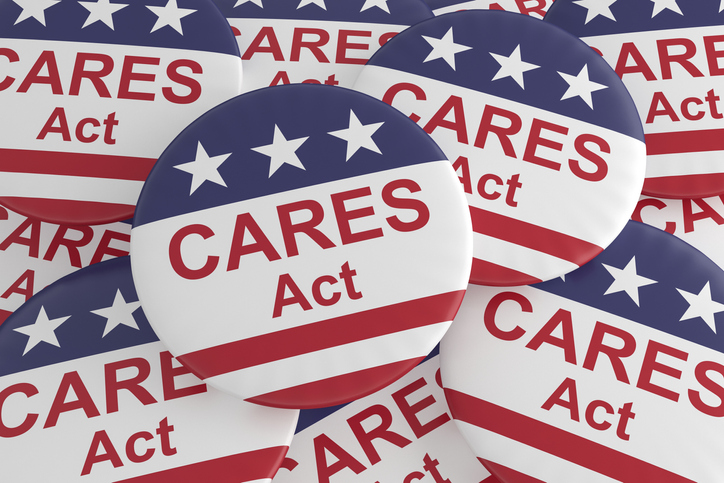 Let’s look at the key income tax provisions in the CARES Act. While a great deal of attention has been given to the availability of business loans under the Paycheck Protection Program, businesses can also take advantage of certain changes to the Internal Revenue Code (“IRC”) in the Coronavirus Aid, Relief, and Economic Security Act (“CARES Act”). Here are beneficial provisions:
Let’s look at the key income tax provisions in the CARES Act. While a great deal of attention has been given to the availability of business loans under the Paycheck Protection Program, businesses can also take advantage of certain changes to the Internal Revenue Code (“IRC”) in the Coronavirus Aid, Relief, and Economic Security Act (“CARES Act”). Here are beneficial provisions:
Download Printable Article (PDF) >>>
Bonus Depreciation of Qualified Improvement Property in CARES Act
Under the CARES Act, “Qualified Improvement Property” (“QIP”) is now classified as 15-year property that is eligible for bonus depreciation through 2022 and is subject to a 20-year life under the Alternative Depreciation System (ADS), effective for tax years beginning after December 31, 2017. Under Section 168 of the IRC, “QIP” includes any improvement to the interior portion of a nonresidential building placed in service after the building, other than (i) an enlargement of the building, (ii) any elevator or escalator, and (iii) any internal structural framework of the building. These changes effectively correct the Tax Cuts and Jobs Act of 2017 (“TCJA”), in which Congress inadvertently disqualified QIP placed in service after December 31, 2017 from 100% bonus depreciation.
Because these changes are retroactive, you may be able to amend your 2018 income tax returns or amend/adjust your 2019 returns (depending on whether those returns have been filed) to take advantage of the changes. Additionally, if these changes create a net operating loss (NOL) in 2018 or 2019, you may be able to take advantage of another provision in the CARES Act, described below.
Business Loss Provisions in CARES Act
The CARES Act allows taxpayers to carry back net operating losses (NOLs) arising in tax years ending after December 31, 2017 and before January 1, 2021 to the five (5) prior tax years. The Act also allows taxpayers to apply NOLs to offset 100% of the taxpayer’s income in tax years prior to January 1, 2021; previously, taxpayers were limited to applying NOLs to 80% of their taxable income. C corporations have the option to elect to file for an accelerated refund to claim the benefit of the carryback. Real Estate Investment Trusts (REITs) are excluded from the carryback provision, and NOL carrybacks cannot be used to offset income included under IRC Section 965(a). See IRC §172.
The CARES Act also removes the limitation on excess business losses for taxpayers other than corporations for tax years beginning after December 31, 2017 and before January 1, 2021. See IRC §461(l).
Business Interest Deductions
Under the TCJA, a taxpayer could deduct a portion of its business interest expense equal to business income plus 30% of adjusted taxable income (ATI) – essentially, taxable income without depreciation and certain other deductions. For tax years beginning in 2019 and 2020, the CARES Act increases the formula threshold to 50% of ATI. For partnerships, the increase to the ATI threshold is only applicable for tax years beginning in 2020. In calculating the deductible amount of business interest expense, taxpayers (including partnerships) may also elect to substitute 2019 ATI for 2020 ATI. See IRC 163(j).
Charitable Contribution Deductions in CARES Act
The CARES Act increases the limitation on charitable contributions for corporations from 10% of taxable income to 25% of taxable income, and the limitation on contribution to food inventory is increased from 15% to 20%. See IRC §170.
In addition, for individuals who itemize their deductions, the CARES Act suspends the percentage limitation on the deduction for qualifying charitable contributions for the 2020 tax year. This means that taxpayers who itemize may effectively deduct qualifying charitable contributions up to an amount equal to their adjusted gross income. Previously, the deduction for qualifying charitable contributions was limited to 60% of an individual taxpayer’s adjusted gross income. See IRC §62.
This e-alert is provided by Hyland Levin Shapiro LLP as a general summary of the topics discussed; it does not replace the need to consult with a legal or tax professional and is not intended to be a substitute for competent professional advice, including any advice regarding the effect of the CARES Act on your particular business. If you have any questions about the provisions summarized above, please contact Stephen M. Geria at geria@hylandlevin.com or 856.355.2920 or Harvey Shapiro at shapiroh@hylandlevin.com or 856.355.2990.


To ensure compliance with U.S. Treasury Department Circular 230, which governs all practitioners before the Internal Revenue Service, we are required to inform you that any tax advice that may be contained in this communication is not intended or written to be used, nor can be used, by any recipient for the purpose of (i) avoiding penalties that might be imposed pursuant to the Internal Revenue Code or U.S. Treasury Regulations, or applicable state or local law or regulation; or (ii) promoting, marketing or recommending to another party any tax-related matters addressed herein.


